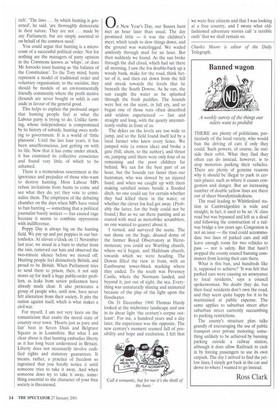Banned wagon
A weekly survey of the things our rulers want to prohibit
THERE are plenty of politicians, particularly of the local variety, who would ban the driving of cars if only they could. Such powers, of course, lie outside their orbit. What they find they often can do instead, however, is to stop motorists parking their vehicles. There are plenty of genuine reasons why it should be illegal to park in certain places, such as where it causes congestion and danger. But an increasing number of double yellow lines are there out of sheer bloodymindedness.
The road leading to Whittlesford station in Cambridgeshire is wide and straight; in fact, it used to be an 'A' class road but was bypassed and left as a dead end following the construction of a railway bridge a few years ago. Congestion is not an issue — the road could accommodate two lines of parked cars and still leave enough room for two vehicles to pass — nor is safety. But that hasn't stopped the county council banning commuters from leaving their cars there.
What is this ban, and hundreds like it, supposed to achieve? 'It was felt that parked cars were causing an annoyance to local residents,' says a council spokeswoman. No doubt they do, but then local residents don't own the road, and they seem quite happy for it to be maintained at public expense. The same applies to suburban street after suburban street currently succumbing to parking restrictions.
The county's structure plan talks grandly of encouraging the use of public transport over private motoring; something unlikely to be achieved by banning parking outside a railway station, although it does allow Railtrack to cash in by forcing passengers to use its own carpark. The day I arrived to find the yellow lines, I simply got back in the car and drove to where I wanted to go instead.
Ross Clark






















































































 Previous page
Previous page